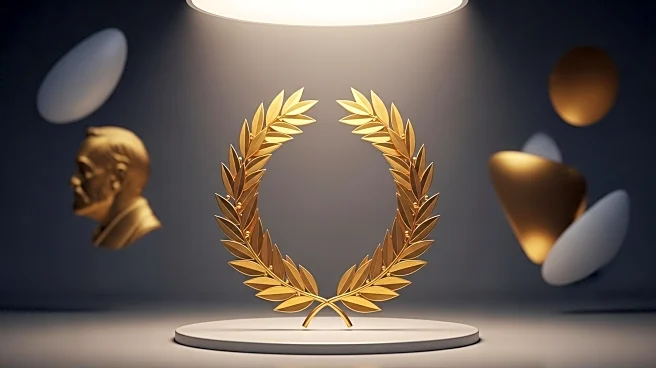What's Happening?
The Nobel Prize announcements for 2025 have concluded with the awarding of the Nobel Peace Prize to Venezuelan opposition leader María Corina Machado. The Nobel Prizes, established by Alfred Nobel, are awarded annually in various categories including medicine, physics, chemistry, literature, and peace. This year, the Nobel Prize in medicine was awarded to Mary E. Brunkow, Fred Ramsdell, and Dr. Shimon Sakaguchi for their work on the immune system, which has implications for autoimmune diseases and cancer treatment. The physics prize recognized John Clarke, Michel H. Devoret, and John M. Martinis for their research on quantum tunneling, which impacts technology such as MRI machines and computing. The chemistry prize was awarded to Susumu Kitagawa, Richard Robson, and Omar M. Yaghi for developing molecular structures that can trap gases, potentially addressing environmental challenges. Hungarian writer László Krasznahorkai received the literature prize for his surreal and anarchic novels. The peace prize was awarded to Machado for her role in unifying the Venezuelan political opposition.
Why It's Important?
The Nobel Prizes highlight significant advancements and contributions across various fields, impacting global scientific research, technological development, and cultural discourse. The recognition of work in medicine and chemistry underscores the ongoing efforts to address critical health and environmental issues, potentially leading to new treatments and solutions for global challenges. The physics prize emphasizes the importance of fundamental research in advancing technology, which can lead to improved medical imaging and faster computing. The literature prize celebrates the power of art to address complex societal issues, while the peace prize acknowledges efforts to promote political unity and human rights. These awards not only honor individual achievements but also inspire continued innovation and dialogue in their respective fields.
What's Next?
The Nobel Prize ceremony will take place on December 10, commemorating the anniversary of Alfred Nobel's death. The event will bring together laureates and dignitaries to celebrate the achievements recognized this year. The winners' work is expected to influence ongoing research and development in their fields, potentially leading to new collaborations and advancements. María Corina Machado's recognition may impact political dynamics in Venezuela, highlighting the importance of opposition movements in challenging authoritarian regimes. The laureates' contributions will likely continue to inspire future generations of scientists, writers, and activists, fostering progress and innovation.
Beyond the Headlines
The Nobel Prizes often spark discussions about the ethical and societal implications of scientific and literary work. The recognition of research in medicine and chemistry raises questions about the accessibility and application of new technologies and treatments, particularly in addressing global health and environmental issues. The literature prize highlights the role of art in critiquing political systems and advocating for change, emphasizing the intersection of culture and politics. The peace prize draws attention to the challenges faced by opposition leaders in authoritarian contexts, underscoring the importance of international support for human rights and democratic movements.











